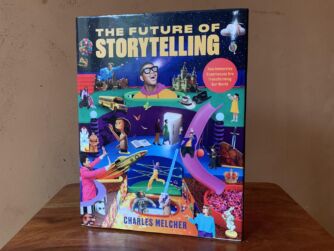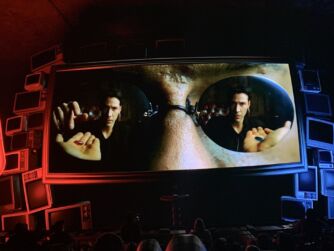 Sandra Whelan talks about the Virtual Reality Reviewer website that she runs with her husband David Whelan.
Sandra Whelan talks about the Virtual Reality Reviewer website that she runs with her husband David Whelan.
Become a Patron! Support The Voices of VR Podcast Patreon
Theme music: “Fatality” by Tigoolio
Subscribe to the Voices of VR podcast.
Rough Transcript
[00:00:05.452] Kent Bye: The Voices of VR Podcast.
[00:00:09.875] Sandra Whelan: Hi, it's Sandra here. People will recognize the voice from the Virtual Reality Reviewer website that myself and David run. The new release of Titans of Space will be out shortly and there will be audio with that. And I'm the voice of Titans of Space. so you need to go and check it out. I'm not too sure, I know Josh is very busy at the moment and he did get Telescopic, it's in the final listener for the VR Jam, so I know he is going to be very busy with that, but over the next maybe month or two, I think we're hoping to get a release date on that. So yeah, so if you enjoy listening to my voice, definitely try out Titans of Space with the audio. And what we're doing here today at SVVR is we're here with our company, Immersive VR Education. Now that's best known for the team behind the Apollo project. So what we have here today on the show floor is the new version of the Apollo project that we just released about two or three days ago. my times at the moment with the jet lag. But yeah, and we also have a really cool thing. I think it's Lecture VR is what it's called. It's an educational platform. And what it will do is it will allow students from any age, any demographic, any financial background, the access to the best educators from the best institutions in the world. So we're really, really excited about that. And we're getting great feedback from everybody here on the floor. So that's our main push here today, just to get that out there and just let everybody know that that's what we're working on.
[00:01:30.494] Kent Bye: Awesome, yeah, and I talked in length with both David and Mike. Yeah, I still got a back story of what the latest is, but I'm really curious about this virtual reality review, how that came about, and that process of working on this site.
[00:01:42.079] Sandra Whelan: To be honest, I was never really into, I'm not a gamer, I've never been into games, David is more the game guy and when Oculus went on Kickstarter, David was one of the first to back the DK1. So the DK1 arrived and David said you have to try this out, like it's absolutely fantastic. Me, I had no idea, I wasn't really a gamer, I wasn't into anything like that, but I tried it and the first thing that I tried on it was Titans of Space because that's the first thing that everybody puts you into. So I tried Titans of Space. Straight away I was sold. I went, oh, this is fantastic. And when we went online, what we were finding was there was a lot of let's play videos. And it was all, oh, this makes me feel so sick. And this makes me feel crazy. Granted, the DK1 did do that to people. I was the same kind of a little bit. But it made it seem like, oh, here comes this virtual reality. And everything that you go into is going to make you feel sick. And all these over-exaggerated let's play videos. And we thought, there's so many developers, there's so many people doing great things, that's not just games. We need to kind of create a professional review of all this other content. There was plenty of other developers out there, they weren't being heard, their content wasn't even being looked at. Because unless it was a jump scare video or something like that, the let's play genre kind of didn't really have an appreciation of it. It had to be, oh wow, and look this is so scary and jumping. So that's what we did. So David does. I do some of the reviews, but David is a great writer and David does a lot of the reviews. And then because his accent, to be honest, is so thick and I don't think people could understand it. I tend to voice a lot of what he does. People often make comments when the reviews go up. It says on it review by David Whelan. And then I start to speak and there's always comments being made about that because they might think he's a woman. But no, that's really how it was born. And it's been going about 16 months or so, I think now at the moment. And I think we've just reached like 5000 subscribers. So we're really, really happy with that. So long may it continue. Yeah, we're really enjoying it. And as long as there's good content out there, we encourage everybody to send us all their content, send us everything. Sometimes there's not enough errors in the day, but if you want to send it to us, we will always try to get to something. And like a full video from start to finish from David, kind of looking at it, to writing out the text, to me narrating it. It can take six or seven hours. It is a long process to do. But if anyone wants to send us something, we'll have a quick look through it. Or even if anybody wants to send us any written content, maybe an article or something themselves, we'll definitely publish it on the website. Because that's what we want to do. We want to get the best content out there to people, let them know what's out there, let them know what the developers are currently working on, regardless of whether it is education or games or anything. Just send it to us and we will look at it for you.
[00:04:07.658] Kent Bye: Yeah, I think you do a great job of kind of creating these really tightly edited and smart reviews and doing critiques in a lot of ways. And so what has been the response to the developer community of sort of having their work evaluated in this way, or I guess in some ways evaluated but also promoted?
[00:04:24.185] Sandra Whelan: I think they know when they send it that we are going to be very honest. I mean, we have done some in the past and we have gotten messages underneath it going, oh my God, I can't believe you actually said that about it, but I think it's only fair. Like we do know a lot of the developers in the community as well and they will send us stuff, but they know that when they send it, that when myself and David look at it, we're not going to look at it as we know this person, we're going to look at it as this is the content, this is what we've been sent. And we also, you'll notice there is a kind of a pattern. We always try to start off, this is what it's about. In the middle, we kind of say, look, this is where it does need to improve on it. We're not going to hold back. This is what you need to do. It's all constructive. We're not there to put anybody down. And we always finish on a positive as well and say, look, this is what we think you could do a little bit better. So it's all very constructive. And I think people are aware when they send it to us, you know, if their content is good, that's great. If their content is not great, we will tell them it's not that great, but not in a derogatory way. That's not what we're there for. We're there to help them promote their content. And if we can help them in constructive criticism in any way, we'll do that.
[00:05:20.896] Kent Bye: Yeah, and I, as a VR developer, I've had the experience of putting things out there and kind of having it like crickets, no response at all. And that's actually what initiated, in some part, me doing the Voices of VR podcast after I did the Game Jam back in... January of 2014, and then I was like, wow, I want to be a part of this community more. Let's sort of feature what other people are doing. But in the process of even doing this latest Game Jam, I was going through different experiences and I was like, oh wow, I've got all this feedback, but I'm not sure if it's really welcomed or if people really actually want it and so I started a thread on Reddit and there was a lot of people that were really hungry and were open for like getting honest critiques and feedback because as VR developers we actually need that feedback in order to succeed and make better VR experiences and what I found that was really interesting is that it actually made me a better VR designer to be able to actually break down something and then not only just critique it but really think about what are some of the other options that they could do to actually make it better. So what's been your experience in terms of doing these critiques and learning from that to be able to create your own VR?
[00:06:29.978] Sandra Whelan: Well a prime example of this would be when we started the Apollo project and of course we started it and we thought oh this is great and we storyboarded it out and we said we'll create a room and we'll do this and we'll do that and we literally only had it out about two days and everything all the feedback started to come back in criticizing the room and you know stuff like that you need to change the room you need to do this you need to do that But it was all positive, constructive feedback and we actually went online, I went on to Reddit and I said, listen, you tell us what you want in it, we'll do it. You tell us what we can do to make it better, we'll make it better. So as long as like that, it's positive critique and it's constructive critique, like we've had that back is what I'm trying to say. We give it out, but we've also had it in return and we appreciate it. So I think from our point of view, if we appreciate getting the critique, I think that the developers as well do appreciate when we do it to them because it helps make their experiences a bit better.
[00:07:19.425] Kent Bye: How many different reviews have you guys done up to this point, do you know?
[00:07:23.087] Sandra Whelan: Oh, I think we're on probably on video, maybe 150 or something like that. I know we got to, I think we got to our 100 video just a few months ago now. So yeah, I'd say we're nearly up on maybe 100 and 150 now. Out of all those 150, David's probably done 130 of them, you know, and I've just done 20 of them. But you see, like that, because I'm not a gamer, like I'm more of an experienced kind of person. As in, Senza Peso, that's one of my favorite things. Titans of Space, that's one of my favorite things. things that I can actually sit in. There's a brilliant one at the moment called the Night Cafe and again it got into the VR jam and it's like you're sitting in Vincent van Gogh's painting. And anything kind of on rails I love. Anything gamey I'm not really that into so when we get games and like first-person shooter games and all this, David is the one to review them. When we get kind of experiencey games they're the kind of things that I like to enjoy so depends really on what people send us as to who will do the review.
[00:08:16.523] Kent Bye: So finally, what do you see as the ultimate potential for virtual reality and what it might be able to enable?
[00:08:22.747] Sandra Whelan: Well, I mean, our main focus is obviously the education and I'm sorry to harp back onto it the whole time, but I think that the use of virtual reality in education, it's going to revolutionize education. I think it's going to be absolutely fantastic. I mean, we've tried this out. We're over here, obviously, in the States, but we have actually gone into classrooms to children over in Ireland. They've tried the headset, they've tried like the Apollo 11 project and the feedback we've had from teachers and from the students themselves has been fantastic. It needs to be a part of education. So I think looking at it away from a game side and an experience side, I think education is very, very important. And I think virtual reality is going to revolutionize that.
[00:09:00.750] Kent Bye: Awesome. Well, thank you.
[00:09:01.550] Sandra Whelan: No, you're welcome.
[00:09:03.651] Kent Bye: And thank you for listening. If you'd like to support the Voices of VR podcast, then please consider becoming a patron at patreon.com slash Voices of VR.



